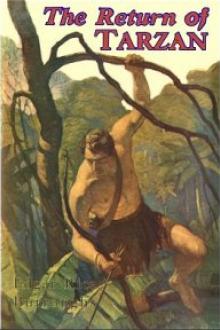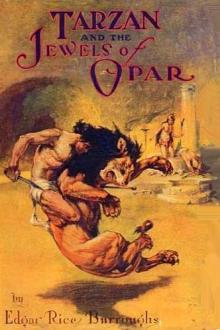The Return of Tarzan by Edgar Rice Burroughs (best romantic novels in english .txt) 📕

- Author: Edgar Rice Burroughs
- Performer: -
Book online «The Return of Tarzan by Edgar Rice Burroughs (best romantic novels in english .txt) 📕». Author Edgar Rice Burroughs
Through narrow, stinking alleys, black as Erebus, he groped, and then up a rickety stairway, at the end of which was a closed door and a tiny, unglazed window. The window was high under the low eaves of the mud building. Tarzan could just reach the sill. He raised himself slowly until his eyes topped it. The room within was lighted, and at a table sat Rokoff and Gernois. Gernois was speaking.
“Rokoff, you are a devil!” he was saying. “You have hounded me until I have lost the last shred of my honor. You have driven me to murder, for the blood of that man Tarzan is on my hands. If it were not that that other devil’s spawn, Paulvitch, still knew my secret, I should kill you here tonight with my bare hands.”
Rokoff laughed. “You would not do that, my dear lieutenant,” he said. “The moment I am reported dead by assassination that dear Alexis will forward to the minister of war full proof of the affair you so ardently long to conceal; and, further, will charge you with my murder. Come, be sensible. I am your best friend. Have I not protected your honor as though it were my own?”
Gernois sneered, and spat out an oath.
“Just one more little payment,” continued Rokoff, “and the papers I wish, and you have my word of honor that I shall never ask another cent from you, or further information.”
“And a good reason why,” growled Gernois. “What you ask will take my last cent, and the only valuable military secret I hold. You ought to be paying me for the information, instead of taking both it and money, too.”
“I am paying you by keeping a still tongue in my head,” retorted Rokoff. “But let’s have done. Will you, or will you not? I give you three minutes to decide. If you are not agreeable I shall send a note to your commandant tonight that will end in the degradation that Dreyfus suffered—the only difference being that he did not deserve it.”
For a moment Gernois sat with bowed head. At length he arose. He drew two pieces of paper from his blouse.
“Here,” he said hopelessly. “I had them ready, for I knew that there could be but one outcome.” He held them toward the Russian.
Rokoff’s cruel face lighted in malignant gloating. He seized the bits of paper.
“You have done well, Gernois,” he said. “I shall not trouble you again—unless you happen to accumulate some more money or information,” and he grinned.
“You never shall again, you dog!” hissed Gernois. “The next time I shall kill you. I came near doing it tonight. For an hour I sat with these two pieces of paper on my table before me ere I came here—beside them lay my loaded revolver. I was trying to decide which I should bring. Next time the choice shall be easier, for I already have decided. You had a close call tonight, Rokoff; do not tempt fate a second time.”
Then Gernois rose to leave. Tarzan barely had time to drop to the landing and shrink back into the shadows on the far side of the door. Even then he scarcely hoped to elude detection. The landing was very small, and though he flattened himself against the wall at its far edge he was scarcely more than a foot from the doorway. Almost immediately it opened, and Gernois stepped out. Rokoff was behind him. Neither spoke. Gernois had taken perhaps three steps down the stairway when he halted and half turned, as though to retrace his steps.
Tarzan knew that discovery would be inevitable. Rokoff still stood on the threshold a foot from him, but he was looking in the opposite direction, toward Gernois. Then the officer evidently reconsidered his decision, and resumed his downward course. Tarzan could hear Rokoff’s sigh of relief. A moment later the Russian went back into the room and closed the door.
Tarzan waited until Gernois had had time to get well out of hearing, then he pushed open the door and stepped into the room. He was on top of Rokoff before the man could rise from the chair where he sat scanning the paper Gernois had given him. As his eyes turned and fell upon the ape-man’s face his own went livid.
“You!” he gasped.
“I,” replied Tarzan.
“What do you want?” whispered Rokoff, for the look in the ape-man’s eyes frightened him. “Have you come to kill me? You do not dare. They would guillotine you. You do not dare kill me.”
“I dare kill you, Rokoff,” replied Tarzan, “for no one knows that you are here or that I am here, and Paulvitch would tell them that it was Gernois. I heard you tell Gernois so. But that would not influence me, Rokoff. I would not care who knew that I had killed you; the pleasure of killing you would more than compensate for any punishment they might inflict upon me. You are the most despicable cur of a coward, Rokoff, I have ever heard of. You should be killed. I should love to kill you,” and Tarzan approached closer to the man.
Rokoff’s nerves were keyed to the breaking point. With a shriek he sprang toward an adjoining room, but the ape-man was upon his back while his leap was yet but half completed. Iron fingers sought his throat—the great coward squealed like a stuck pig, until Tarzan had shut off his wind. Then the ape-man dragged him to his feet, still choking him. The Russian struggled futilely—he was like a babe in the mighty grasp of Tarzan of the Apes.
Tarzan sat him in a chair, and long before there was danger of the man’s dying he released his hold upon his throat. When the Russian’s coughing spell had abated Tarzan spoke to him again.
“I have given you a taste of the suffering of death,” he said. “But I shall not kill—this time. I am sparing you solely for the sake of a very good woman whose great misfortune it was to have been born of the same woman who gave birth to you. But I shall spare you only this once on her account. Should I ever learn that you have again annoyed her or her husband—should you ever annoy me again—should I hear that you have returned to France or to any French posession, I shall make it my sole business to hunt you down and complete the choking I commenced tonight.” Then he turned to the table, on which the two pieces of paper still lay. As he picked them up Rokoff gasped in horror.
Tarzan examined both the check and the other. He was amazed at the information the latter contained. Rokoff had partially read it, but Tarzan knew that no one could remember the salient facts and figures it held which made it of real value to an enemy of France.
“These will interest the chief of staff,” he said, as he slipped them into his pocket. Rokoff groaned. He did not dare curse aloud.
The next morning Tarzan rode north on his way to Bouira and Algiers. As he had ridden past the hotel Lieutenant Gernois was standing on the veranda. As his eyes discovered Tarzan he went white as chalk. The ape-man would have been glad had the meeting not occurred, but he could not avoid it. He saluted the officer as he rode past. Mechanically Gernois returned the salute, but those terrible, wide eyes followed the horseman, expressionless except for horror. It was as though a dead man looked upon a ghost.
At Sidi Aissa Tarzan met a French officer with whom he had become acquainted on the occasion of his recent sojourn in the town.
“You left Bou Saada early?” questioned the officer. “Then you have not heard about poor Gernois.”
“He was the last man I saw as I rode away,” replied Tarzan. “What about him?”
“He is dead. He shot himself about eight o’clock this morning.”
Two days later Tarzan reached Algiers. There he found that he would have a two days’ wait before he could catch a ship bound for Cape Town. He occupied his time in writing out a full report of his mission. The secret papers he had taken from Rokoff he did not inclose, for he did not dare trust them out of his own possession until he had been authorized to turn them over to another agent, or himself return to Paris with them.
As Tarzan boarded his ship after what seemed a most tedious wait to him, two men watched him from an upper deck. Both were fashionably dressed and smooth shaven. The taller of the two had sandy hair, but his eyebrows were very black. Later in the day they chanced to meet Tarzan on deck, but as one hurriedly called his companion’s attention to something at sea their faces were turned from Tarzan as he passed, so that he did not notice their features. In fact, he had paid no attention to them at all.
Following the instructions of his chief, Tarzan had booked his passage under an assumed name—John Caldwell, London. He did not understand the necessity of this, and it caused him considerable speculation. He wondered what role he was to play in Cape Town.
“Well,” he thought, “thank Heaven that I am rid of Rokoff. He was commencing to annoy me. I wonder if I am really becoming so civilized that presently I shall develop a set of nerves. He would give them to me if any one could, for he does not fight fair. One never knows through what new agency he is going to strike. It is as though Numa, the lion, had induced Tantor, the elephant, and Histah, the snake, to join him in attempting to kill me. I would then never have known what minute, or by whom, I was to be attacked next. But the brutes are more chivalrous than man—they do not stoop to cowardly intrigue.”
At dinner that night Tarzan sat next to a young woman whose place was at the captain’s left. The officer introduced them.
Miss Strong! Where had he heard the name before? It was very familiar. And then the girl’s mother gave him the clew, for when she addressed her daughter she called her Hazel.
Hazel Strong! What memories the name inspired. It had been a letter to this girl, penned by the fair hand of Jane Porter, that had carried to him the first message from the woman he loved. How vividly he recalled the night he had stolen it from the desk in the cabin of his long-dead father, where Jane Porter had sat writing it late into the night, while he crouched in the darkness without. How terror-stricken she would have been that night had she known that the wild jungle beast squatted outside her window, watching her every move.
And this was Hazel Strong—Jane Porter’s best friend!
Let us go back a few months to the little, windswept platform of a railway station in northern Wisconsin. The smoke of forest fires hangs low over the surrounding landscape, its acrid fumes smarting the eyes of a little party of six who stand waiting the coming of the train that is to bear them away toward the south.
Professor Archimedes Q. Porter, his hands clasped beneath the tails of his long coat, paces back and forth under the ever-watchful eye of his faithful secretary, Mr. Samuel T. Philander. Twice within the past few minutes he has





Comments (0)